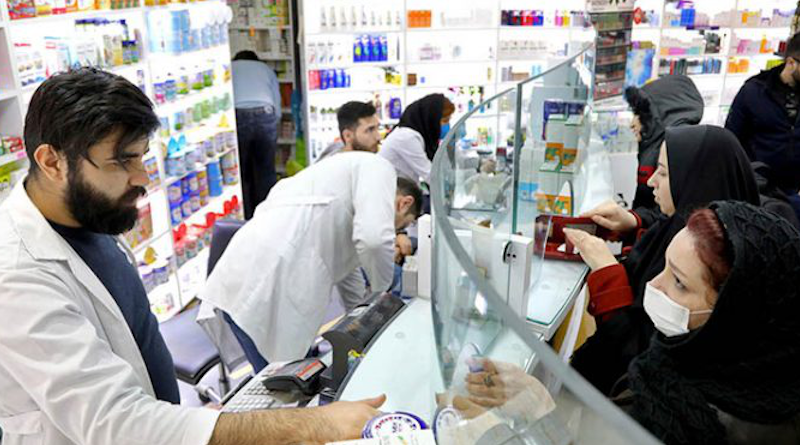Iran’s Medicine Mafia Behind Shortages And High Cost of Prescription Drugs – OpEd
A short prelude
Since the birth of the tyrannical regime of the mullahs in Iran, another social and scary phenomenon was also born; widespread monopolization. After the 1979 anti-monarchy revolution in Iran and the establishment of the religious dictatorship, the vultures of power in the regime began to dominate and take control of major outlets of the economy. The creation of a slew of fake and non-existent legal and illegal entities, holdings, bank accounts, and firms were the malign product of this domination and control.
After the passage of more than four decades, the Iranian economy is recognized by its two distinct fronts. On one hand is the regime, its suppressive forces, and its affiliates, and on the other hand, the people of Iran.
The first front is dominated by the office of Iran’s supreme leader, Khamenei who owns around $200 billion in assets, the notorious Islamic Revolutionary Guards Corps (IRGC), and a host of other like-minded entities.
The second front is made up of Iran’s ordinary citizens who, according to Parliament Speaker Ghalibaf, consist of about 94% of the population.
The current state of prescription drugs in Iran
The availability and affordability of prescription drugs in Iran took a sharp dip more than two years ago and it’s become almost impossible to find foreign medicine after the recent pandemic. According to media reports, ordinary Iranians are experiencing a severe shortage of prescription drugs, and the price of medication is skyrocketing all over the country.
Many people complain that pharmacies are unable to provide their prescriptions. As expected, government officials are offering conflicting reasons — including U.S. sanctions — for the shortages and price hikes; however, pharmacists blame the government’s own healthcare mismanagement, corruption, black market, and the collapse of Iran’s currency.
In September 2018, it was reported that the price of drugs prescribed for dialysis and kidney transplant patients had gone up between 100 to 300 percent since March of the same year. Other prescription drugs have also experienced such unprecedented price hikes. Many senior officials in the governments of former President Hassan Rouhani, and current President Ebrahim Raisi have attributed current drug shortages to economic sanctions imposed by the U.S. Yet, the U.S. Department of Treasury’s list does not include medicine.
The source of the problem
The real reason behind the lack of prescription drugs lies in the corrupt system of the Iranian regime and its dominance over the pharmaceutical industry.
Iran’s medicine mafia is not a new phenomenon; with the beginning of the COVID-19 pandemic in Iran in 2019, people had to go through a winding path of illegal channels and contacts, referred to as Iran’s medicine mafia, instead of pharmacies, to get prescription drugs, often paying much more than the declared price. Looking back, one could reach this realization that Iran’s medicine mafia had existed for many years, but the spread of COVID-19 helped it gain more power and expansion.
Regarding the shortage of some items in pharmacies, Ali Fatemi, vice president of the Iranian Pharmacists Association, said “Previously, the shortage of drugs was related to foreign drugs and drugs for certain diseases, but now we have problems to supply some Iranian drugs and this shortage in our country is unprecedented”.
Iran’s new budget and prescription drugs
To raise funds for its budget deficit, the government of Ebrahim Raisi is planning to eliminate all pre-existing subsidies for prescription drugs. Faced with public anger and widespread criticism from the regime’s own analysts and politicians, government officials claim that prescription drugs will still be subsidized because they fall under the category of the subsidized exchange rate.
However, the executives of drug importing companies insist that the allocated prescription subsidies in the budget are not enough to meet the needs. The General Manager of Drug Affairs confirmed the concerns raised by pharmaceutical companies about the subsidies and their availability.
Iranians are angered by reports of medicine trafficking and the sale of medicine on the black market, which is owned and controlled by regime elites. This is while officials claim they have enough funds to import certain drugs; drugs that cannot be found in pharmacies and find their way on the black market at outrageous prices.
In a report in January, Col. Davoud Moazami Goudarzi, the head of Tehran’s Cyber Police said an Instagram page with more than 90,000 followers was found to be selling drugs in cyberspace. The report said more than 500,000 rare drugs were confiscated from the site.
In conclusion
It is safe to say that in principle, there is enough medicine in the country, but Iran’s medicine mafia, aka regime elites and the IRGC, sell the medicine to desperate patients via the black market to make more money. Most Iranians can’t afford to buy drugs off the black market which has and can lead to more deaths and poverty

